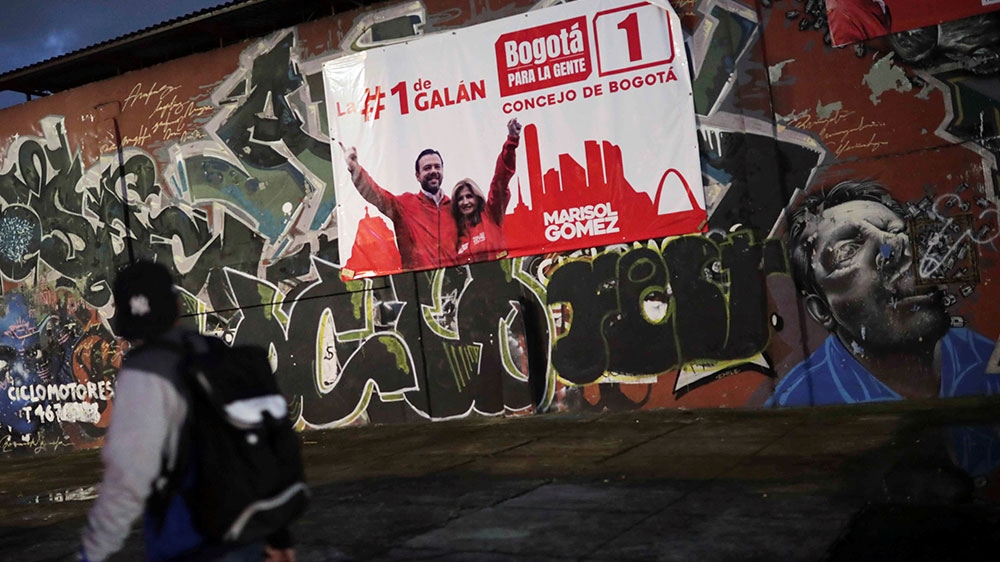Colombians vote in first local elections since 2016 peace deal
The lead up to the elections has been marred by violence, with at least seven candidates killed and others attacked.

Bogota, Colombia – Colombians are heading to the polls to elect regional legislators, provincial governors and mayors nationwide after several months of violence and threats against candidates.
Sunday’s elections will be the first at the regional and local level since the signing of the controversial peace deal between the government and the Revolutionary Armed Forces of Colombia (FARC) in 2016, which ended a bloody 52-year long conflict.
Keep reading
list of 3 itemsColombia elections: Candidates face spate of violence
Armoured cars scarce as Colombia elections near
“This is the first local election after the peace agreement, so it’s very important for peace-building, especially in the most peripheral territories,” said Yann Basset, a political science professor at Rosario University.
Thirty-two governors, more than 1,000 mayors and thousands of regional and local legislative legislators will be elected.
Basset said in many regions the peace agreement has worked well, especially in the eastern part of the country. But in the western regions, violence increased because of the regrouping of drug trafficking cartels and armed groups.
Seven candidates were killed during the three months of campaigning, with thousands of others requesting protection from the National Protection Unit (UNP) – the agency that provides bodyguards and other protections to public figures.
“There is more violence this year than previously, and we think this shows the challenges Colombia is facing to really implement the peace agreement – ending political exclusion that created the war 60 years ago. We are facing the challenge of society and the State to really give all the guarantees to participate in politics in Colombia,” said Camilo Vargas, researcher at MOE, an independent organisation monitoring elections in Colombia.

Sergio Guzman, political analyst and director of Colombia Risk Analysis, said that “broadly speaking, these elections will be a measure of how much, if at all, Colombian democracy has evolved from a traditional, family-based system to a process driven by party and policy platforms”.
He added that “family affiliation continues to be a primary determinant of candidacies and party endorsements across the political spectrum”.
Guzman also said the elections will show where Colombian public opinion stands one year into the right-wing presidency of Ivan Duque who is affiliated with the Democratic Centre political party, headed by ex-president Alvaro Uribe, who currently faces criminal charges.
Electoral corruption has also increased, with 3,200 citizen reports of corruption, according to MOE.
Vargas said that four years ago the MOE received nearly 4,600 reports of electoral corruption, but given that most reports come on election day, the organisation expects a higher total this year.
Most of the citizen reports MOE receives relate to interference of public servants in election campaigns.
“The buying of votes is traditional, or private businesses pressuring citizens to vote for particular candidates,” Vargas told Al Jazeera.
FARC’s first local elections
Sunday’s vote will also show how other political parties are doing in the eyes of the public as well.
It will be the first time the FARC, who have kept the same acronym for their newly established political party known as the Common Alternative Revolutionary Force, will run in local and regional elections.
“They will try to win votes, not necessarily in the regions where they had presence as a guerrilla group. The results will be indicative of the strength they have as a political party,” said Laura Wills, director of the political science department at The University of Los Andes.
“It’s a big challenge for them, not only because they are not popular among the population, but because the party is new and not very well organised,” Wills told Al Jazeera.

Guzman said the elections will likely be a test of the ability of alternative parties to “chip away power from traditional parties”, a trend that emerged in Colombia’s more sophisticated urban centres but remains elusive in peripheral regions.
“We see the diminished importance of ideology and political parties,” Guzman said. “Many candidates are the product of alliances between ideologically incompatible parties, while others have broken away from parties altogether and are running independently.”